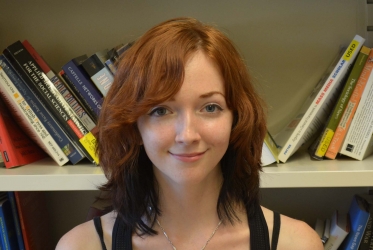CNS-UCSB Undergrad Researcher Eyes Future as Environmental Researcher

While attending a panel discussion at the Society and Technology Policy Institute (STPI) in Washington, D.C. this summer, undergraduate psychology major Catherine Enders noticed a STPI employee with a UCSB water bottle. Upon approaching this stranger, she learned that it was Emily Nightingale, a UCSB Global Studies alum.
Enders also learned that, like her, Nightingale had been an undergraduate researcher at the UCSB Center for Nanotechnology in Society (CNS-UCSB). Likewise, both were in D.C. due to opportunities afforded to them via CNS-UCSB. Nightingale is currently serving out a two-year policy fellowship at STPI (which was founded by former CNS-UCSB Graduate Fellow Rachel Parker). Enders was participating in the Program to Increase Diversity in Science & Technology Studies and Science Policy Fields (POSTS), which is run by CNS-UCSB’s sister center at Arizona State University.
The purpose of POSTS is to encourage women, minorities, and persons with disabilities to pursue professional careers in science policy or academic science & technology studies fields. Scholars complete a personalized research project under a mentor and attend two summer workshops in Washington, D.C. It was at the first of these workshops where Enders met Nightingale.
Enders was encouraged to apply for the program by CNS Director Barbara Herr Harthorn, who is also serving as her POSTS mentor. While the NSF-funded CNS-UCSB is a research center, such centers include educational mandates, and bolster campus pedagogical resources. For 10 years, CNS-UCSB has provided fellowships for graduate students from disciplines across campus. It has also provided internships for community college students and research assistant positions for both undergraduate and graduate UCSB students.
“It was my first chance to work on research that was going to have an impact that was real,” said Enders about her CNS-UCSB position.
Her work at CNS-UCSB entails transcribing and coding transcripts from deliberative workshops. Public deliberations – more commonly referred to as focus groups – conducted by CNS-UCSB help determine public attitudes towards new technologies. Understanding public values, fears, hopes, and concerns can guide both policymakers and innovators in shaping technological development. Earlier CNS-UCSB deliberations focused on health and energy applications of nanotechnology. The most recent workshops – that Enders is helping researchers to understand – focus on the oil and gas extraction technique of hydraulic fracturing, more commonly known as “fracking.”
Working at CNS-UCSB and participating in POSTS has helped Enders to understand the connection between good research and good governance. Considering a career that will impact environmental policy, Enders was especially excited to meet Jeff Morris while in D.C. Morris, Deputy Director of the Office of Pollution Prevention & Toxics at the Environmental Protection Agency, works both on issues of both nanotechnology and fracking.
Back on campus for her senior year, Enders recently learned that she won a Chancellor’s Sustainability Undergraduate Research Internship, which she applied for at the suggestion of Harthorn. This program will provide her funding to design and carry out an experiment on environmental behavior under the supervision of her faculty mentor, psychology professor David Sherman.










